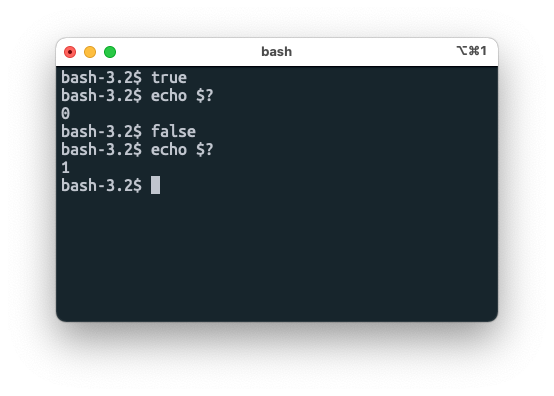
1. 종료 상태(exit status)와 $? 변수
모든 명령어는 종료 상태(exit status) 리턴한다. 명령어가 성공시에는 0을 리턴하고 실패시에는 에러 코드로 해석될 수 있는 non-zero(1~255)를 리턴한다. 마찬가지로 유닉스 관례를 잘 따르는 프로그램, 스크립트 등 이라면, 함수의 가장 마지막에 실행된 명령어가 종료 상태를 결정한다. 출처
$? 변수는 제일 마지막 명령어의 종료 상태 코드 값을 가진다. bash에서는 이렇게 해서 함수의 리턴값을 돌려주는 것이다.
상단의 터미널 이미지 참고 !
2. 종료 상태 코드(exit status code)
몇몇 종료 상태 코드들은 예약되어 있기 때문에 사용자가 임의로 exit 의 매개변수로 쓰면 안 된다. 흔히 프로그램에서 에러 발생시 종료를 위해 exit 1을 쓰는데, 이는 다양한 형태의 에러를 나타내기 때문에 맞는 사용이기도 하지만, 다른 면에서 보면 에러에 대한 유용한 정보를 나타내지 않는다는 것도 의미한다.
| 종료 코드 | 뜻 | 에러메세지 |
|---|---|---|
0 | 성공적으로 실행 | |
1 | 광범위한 일반적 에러 | “Operation not permitted” , "not a valid identifier", "too many arguments" 등 |
2 | 쉘 builtin 명령어의 오사용 | “No such file or directory” 등 |
126 | Permission 문제로 실행 불가능한 명령어의 구동 | "Permission denied", "Is a directory" |
127 | 명령어의 경로($PATH) 문제 혹은 명령어 오타 | “Command not found”, “No such file or directory” |
130 | 치명적 에러 발생으로 인한 종료 (Ctrl+C) | "Script terminated by Ctrl+C” |
255 | exit 에 정수(0~255)가 아닌 인자 넘김 | "numeric argument required" |
3. strerror(errno) 로 에러 메세지 출력하기
42 minishell 과제는 기본적으로 bash를 따르는 것을 원칙으로 하기 때문에 bash의 에러 메세지라고도 볼 수 있다.
현실적으로 미니쉘을 구현하면서, 종료 코드에 맞는 모든 에러 메세지를 미리 설정해 출력하는 건 불가능하다. bash의 모든 에러 상황을 테스트 해볼수는 없기 때문이다.
그럴때 사용하라고 주어진 허용함수가 char *strerror(int errno); 이다. strerror를 통해 에러 번호(errno)와 에러 메세지 문자열을 얻을 수 있다. 아래처럼 테스트 해보니 c에서 errno 변수와 그에 맞는 메세지는 총 108개 내장되어 있는 것 같다.
#include <stdio.h>
#include <string.h>
#include <stdlib.h>
int main(void)
{
int errno = 0;
char *error_message;
printf("< errno와 에러메세지 목록 >\n");
for (errno = 0; errno < 108; errno++)
{
error_message = strerror(errno);
printf("%d. %s\n", errno, error_message);
}
return (0);
}프로그램 실행 결과
< errno와 에러메세지 목록 >
0. Undefined error: 0
1. Operation not permitted
2. No such file or directory
3. No such process
4. Interrupted system call
5. Input/output error
6. Device not configured
7. Argument list too long
8. Exec format error
9. Bad file descriptor
10. No child processes
11. Resource deadlock avoided
12. Cannot allocate memory
13. Permission denied
14. Bad address
15. Block device required
16. Resource busy
17. File exists
18. Cross-device link
19. Operation not supported by device
20. Not a directory
21. Is a directory
22. Invalid argument
23. Too many open files in system
24. Too many open files
25. Inappropriate ioctl for device
26. Text file busy
27. File too large
28. No space left on device
29. Illegal seek
30. Read-only file system
31. Too many links
32. Broken pipe
33. Numerical argument out of domain
34. Result too large
35. Resource temporarily unavailable
36. Operation now in progress
37. Operation already in progress
38. Socket operation on non-socket
39. Destination address required
40. Message too long
41. Protocol wrong type for socket
42. Protocol not available
43. Protocol not supported
44. Socket type not supported
45. Operation not supported
46. Protocol family not supported
47. Address family not supported by protocol family
48. Address already in use
49. Can't assign requested address
50. Network is down
51. Network is unreachable
52. Network dropped connection on reset
53. Software caused connection abort
54. Connection reset by peer
55. No buffer space available
56. Socket is already connected
57. Socket is not connected
58. Can't send after socket shutdown
59. Too many references: can't splice
60. Operation timed out
61. Connection refused
62. Too many levels of symbolic links
63. File name too long
64. Host is down
65. No route to host
66. Directory not empty
67. Too many processes
68. Too many users
69. Disc quota exceeded
70. Stale NFS file handle
71. Too many levels of remote in path
72. RPC struct is bad
73. RPC version wrong
74. RPC prog. not avail
75. Program version wrong
76. Bad procedure for program
77. No locks available
78. Function not implemented
79. Inappropriate file type or format
80. Authentication error
81. Need authenticator
82. Device power is off
83. Device error
84. Value too large to be stored in data type
85. Bad executable (or shared library)
86. Bad CPU type in executable
87. Shared library version mismatch
88. Malformed Mach-o file
89. Operation canceled
90. Identifier removed
91. No message of desired type
92. Illegal byte sequence
93. Attribute not found
94. Bad message
95. EMULTIHOP (Reserved)
96. No message available on STREAM
97. ENOLINK (Reserved)
98. No STREAM resources
99. Not a STREAM
100. Protocol error
101. STREAM ioctl timeout
102. Operation not supported on socket
103. Policy not found
104. State not recoverable
105. Previous owner died
106. Interface output queue is full
107. Unknown error: 107몇 가지 익숙한 에러 메세지들도 보인다. 이제 미니쉘에서 아래 코드 처럼 라고 일일이 에러 메세지를 정의해 줄 필요 없이,
printf("Not a directory");
exit(EXIT_FAILURE);아래 코드 처럼 가능한 상태코드의 에러메세지는 strerror 함수를 통해 출력시키는게 좋을 것 같다.
strerror(errno);
exit(EXIT_FAILURE);4. minishell의 에러 메세지와 $? 값
strerror(errno)로 출력 가능한 에러 메세지들은 다 출력해주고, strerror에 정의되어있지 않은 특이한 에러 메세지들은 직접 테스트해보고 넣어줘야한다. minishell 테스터를 참고하면 어떤 에러메세지가 어떤 상황에 발생하는지 알 수 있다.
예를 들면 아래 메세지들은 흔하게 발생하지만 정의되어 있지 않다.
- "not a valid identifier" (1)
- export
첫 번째 인자와=을 띄어 쓴 경우 - export 인자에 숫자가 포함된 경우
- unset 인자에 숫자가 포함된 경우
- -> export, unset 수정
print_identifier_err()
- export
- "too many arguments" (1)
- exit 인자 많을 때
- minishell: exit: too many arguments
print_execute_err_1()
- exit 인자 많을 때
- “Command not found", (127)
- 이상한 input 들어왔을 때
- minishell: asdasdsdsad: command not found
print_execute_err_1
- 이상한 input 들어왔을 때
- "numeric argument required" (255)
- exit 에 정수가 아닌 인자를 넘긴 경우
- minishell: exit: iiii: numeric argument required
print_execute_err_2()
- exit 에 정수가 아닌 인자를 넘긴 경우
나는 그래서 아래 4개의 함수를 만들어 에러 관련한 메세지들을 모두 처리했다.
-
print_identifier_err()- 환경변수 인자 관련 에러 출력할 함수
-
print_execute_err_1()- 명령어 실행 관련해서 범용으로 사용할 함수
- 에러 메세지에 프로그램 이름과 명령어 이름, 에러메세지가 들어감
-
print_execute_err_2()- 명령어 실행 관련해서 범용으로 사용할 함수
- 에러 메세지에 프로그램 이름과 명령어 이름, 명령어 다음 인자, 에러메세지가 들어감
-
print_errno_err()- exit(EXIT_FAILURE) 하고 strerror(errno) 출력할 함수
5. bash의 에러 메세지 특이 케이스
5.1. 종료코드(1)
1. ls 옵션을 잘못 사용한 경우
bash-3.2$ ls -xyz
ls: illegal option -- y
usage: ls [-@ABCFGHLOPRSTUWabcdefghiklmnopqrstuwx1%] [file ...]
bash-3.2$ echo $?
12. export 첫 번째 인자와 =을 띄어 쓴 경우
bash-3.2$ export test = test
bash: export: `=': not a valid identifier
bash-3.2$ echo $?
1- export 인자=인자 혹은 export 인자= 인자 만 가능
3. export 인자에 숫자가 포함된 경우
bash-3.2$ export 1test=test
bash: export: `1test=test': not a valid identifier
bash-3.2$ echo $?
1- key 경우에만 해당
- value에는 숫자가 들어가도 됨
4. 2번과 3번을 동시에 하는 경우
ash-3.2$ export 123 =
bash: export: `123': not a valid identifier
bash: export: `=': not a valid identifier
bash-3.2$ echo $?
1- 에러메세지 두 개가 나옴
5. exit 정수 인자가 여러 개인 경우
bash-3.2$ exit 42 42
exit
bash: exit: too many arguments
bash-3.2$ echo $?
15.2. 종료코드(127)
환경변수 목록에 없는 변수를 인자로 넣은 경우
bash-3.2$ env xyz
env: xyz: No such file or directory
bash-3.2$ echo $?
127- 근데 평가 항목에 인자 안 넣는 것으로..
5.3. 종료코드(255)
exit 에 정수가 아닌 인자를 넘긴 경우
bash-3.2$ exit ddddd
exit
bash: exit: ddddd: numeric argument required
daelee@daelee$ echo $?
255- 분명 이 글 부록 C. 특별한 의미를 갖는 종료 코드에서는 exit에 잘못된 인자를 넘겼을 때 종료 코드로 128을 넘겨야 된다고 나오는데, 아무리 bash에서 테스트 해봐도 255가 나온다. 출처가 오래된 자료거나 bash가 업데이트 된 것 같다.
- exit code 128, what's the reason? 나랑 비슷한 질문을 한 구글링 자료가 있어서 찾아보니, If n is not an unsigned decimal integer, or is greater than 255, the results(exit status) are unspecified. 출처 라고 한다. 즉, 쉘 마다 버전 마다 다를 수 있다는 것 같다.
- 우리 minishell 에서는 exit(255)로 구현하면 될 것 같다.
minishell-0.0.0$ exit ddddd
minishell: exit: ddddd: numeric argument required
✘ daelee@daelee ~/test/sancho main ± echo $?
255